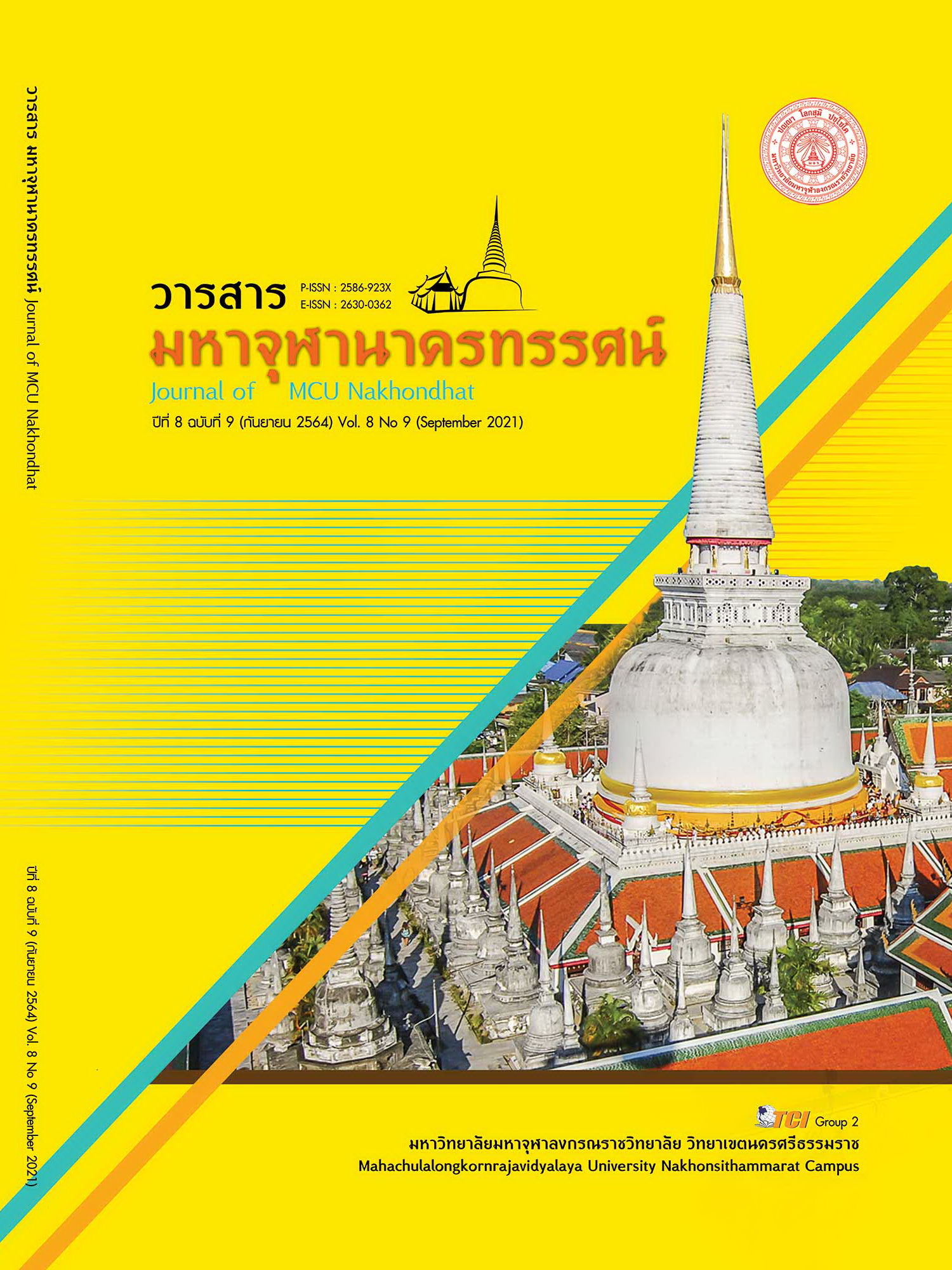A MODEL OF WASTE MANAGEMENT ACCORDING TO THE PHILOSOPHY OF SUFFICIENCY ECONOMY: NARRATIVE STUDY
Main Article Content
Abstract
The purpose of this study was to gain a model of waste management according to the philosophy of sufficiency economy of Ban Tha Ton Chan, Tambol Lad Buo Khaw, Ampor Ban Pong, Ratchaburi province. This research was Qualitative approach with Narrative study based on the philosophical views as framework. The 20 key informants by purposive selection on criterion mentioned, they consisted of 2 groups: 10 waste management workers and 10 coordinators. Data were collected using focus group and in-depth interview. Data were analyzed based on Miles & Huberman. The results showed that the waste management according to the philosophy of sufficiency economy of Ban Tha Ton Chan consists of 7 factors: 1) Reducing waste within families includes reuse, reduce and recycle 2) Network partners building, to build participation from the community to participate in waste reduction activities 3) Profit making, define waste sorting activities, reducing waste is merit, innovation, money to increase income for the community. 4) Mind spiritual, expand activities to see the benefits of sustainable waste reduction 5) Enhancing knowledge about how to change the waste reduction behavior of people in the community and build a learning center on solid waste management for people 6) Moral, promote the habit of reducing waste through various forms of doing good deeds and 7) Continuity of waste reduction activities through temple guidance, schools and community. The suggestion of this study was the other area may be applying a model of waste management according to the philosophy of sufficiency economy of Ban Tha Ton Chan for waste reducing continuous. Additions to activities in which all sectors have been involved in the operation are also a model of waste management.
Article Details
References
กรมส่งเสริมคุณภาพสิ่งแวดล้อม กระทรวงทรัพยากรธรรมชาติและสิ่งแวดล้อม. (2561). คู่มือทำความดีด้วยหัวใจ ลดรับ ลดให้ ลดใช้ถุงพลาสติก. กรุงเทพมหานคร: กระทรวงทรัพยากรธรรมชาติและสิ่งแวดล้อม.
กัญญ์ณณัฎฐ์ วชิรหัตถพงศ์. (2560). การมีส่วนร่วมจัดการขยะมูลฝอยของคนในชุมชนเขตชุมชนเทศบาลเมืองบ้านบึง จังหวัดชลบุรี. ใน วิทยานิพนธ์บริหารธุรกิจมหาบัณฑิต สาขาวิชาการจัดการสาธารณะ. มหาวิทยาลัยบูรพา.
ถวิลวดี บุรีกุล. (2551). การมีส่วนร่วม : แนวคิด ทฤษฎีและกระบวนการ. กรุงเทพมหานคร: สถาบันพระปกเกล้า.
มหาวิทยาลัยรังสิต. (2557). คู่มือ 1A3Rs. เรียกใช้เมื่อ 15 ธันวาคม 2563 จาก http://library.rsu.ac.th/rsulibrary7S/pdf/manual1A3R.pdf
วริษฐา แสงยางใหญ่ และคณะ. (2560). ปัจจัยที่มีผลต่อพฤติกรรมการลดขยะครัวเรือนของประชาชน ในเขตเทศบาลจังหวัดสมุทรปราการ. วารสารสาธารณสุข มหาวิทยาลัยบูรพา, 12(1). 76-87.
วิภาณี อุชุปัจ. (2561). ความรู้พฤติกรรมในการจัดการขยะของประชาชน และคุณภาพการบริการในการจัดการ ขยะขององค์การบริหารส่วนตำบลเหล่ายาว อำเภอบ้านโฮ่ง จังหวัดลำพูน. ใน วิทยานิพนธ์สาธารณสุขศาสตรมหาบัณฑิต สาขาวิชาสาธารณสุขศาสตร์ . มหาวิทยาลัยราชภัฏเชียงใหม่.
อนิณ อรุณเรืองสวัสดิ์. (2559). ขยะกาลังจะล้นโลก ตอนที่ 2. จับกระแสเศรษฐกิจสีเขียว, 2(1), 2-4.
Atkinson, P. & Delamont, S. (ed.). (2006). Narrative Methods Volume 1-4. London: SAGE.
Lincoln, Y.S. & Guba, E.G. (1985). Naturalistic Inquiry. In Bevery Hills. CA: Sage.
Miles, M. B. & Huberman, A. M. (1994). Qualitative data analysis. (2nd ed.). Thousand Oaks. CA: Sage.
Simkins G. & Nolan A. (2004). Environmental Management Systems in University. In Occational Paper for the Environmental Association for Universities and Colleges. March United St.
White P. R.,et al. (1995). Integrated Solid Waste Management: A Lifecycle Inventory. London: T. J. Press.


